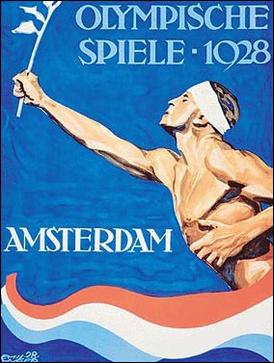Post by StevePulaski on Jan 31, 2018 22:43:11 GMT -5
The IX Olympiad in Amsterdam (1928)
Directed by: Unknown
Directed by: Unknown

Rating: ★★
Film #6/53; part of the Criterion Collection's "100 Years of Olympic Film" box-set
As I sat down to write about The IX Olympiad in Amsterdam, the sixth film in the Criterion Collection's "100 Years of Olympic Film" box-set, I had to remind myself that this film wasn't intended to be released in its current state. A series of short films of the 1928 Summer Olympics in Amsterdam were commissioned by the Dutch Olympic Committee to be conducted by Olympia-Film AG, a studio that failed to honor their financial commitments after recording footage. The contract was then transferred to Istituto Luce, a Fascist Italian studio overseen by dictator Benito Mussolini, which subsequently brought more variety in the games it chose to document. German documentarian Wilhelm Prager then recut the footage into shorts, and what emerges out of such a complicated history is this thirteen-part, four-hour long opus that gives an expansive overview of the games as they were practiced.
The IX Olympiad in Amsterdam, as it's presently called, is not a very good documentary. It's long, indistinguishable from its counterparts, not enhanced by any stylistic attributes, directed with a pedestrian eye for visuals, and spends way too much time on the minute details of several events. It's a completionist's dream come true because it lingers on some events, such as track and field, for up to thirty minutes, and I confess to having fast-forwarded some events when they became too intolerable to bear for an extended length of time. In order to appreciate how far Olympic film has come and what it has to offer, I believe you need to at least challenge yourself to sit through installments of the genre like this; even if such installments are the epitomes of patience-testers and pose questionable rewards when all is said and done.
The 1928 Summer Olympics in Amsterdam consisted of 47 nations competing in a wide variety of events, such as equestrian, swimming, diving, breaststroke, track and field, water polo, and several others. It was the first Olympics to be sponsored by Coca-Cola, a tradition that is still continued today, and it was the first to allow women to compete in track and field races, such as the 800 meter race and races of various distances.
The IX Olympiad in Amsterdam's structure follow each event with a title-card declaring the winners and their home-country, demonstrating a noble effort to humanize and credit the winners of each respective game. The documentary borrows the same finish-line camera techniques as The Games of the V Olympiad Stockholm, 1912, and furthers the inclusion of multiple camera-angles to enhance the experience of watching even the most conventional events, such as pole-vaulting and hammer throwing. The first four parts of the documentary monotonously detail a plethora of track and field events, and it is until around the fifth part the narrative is broken up with a little bit of playfulness in the form of competitors doing a wide range of skills-related activities before the Dutch royal family. Moments like these, in addition to those that show an energized crowd of find a way to creatively capture audiences, break up the redundant showcasing of events that look the same no matter how they are edited.
The monstrous length of this project really shows how lacking sound works against a film like this. When a film is over four hours long, one hopes it has some insight or humanization into those it looks to profile, but The IX Olympiad in Amsterdam's descriptions of Olympians such as Paavo Nurmi, who loses the 5,000 meter run in an emotional scene, and Yoshiyuki Tsuruta, a Japanese swimmer who quite heroically wins the 200 meter breaststroke, are disappointingly minimal. It can't even find an interesting way to capture their feats. By the three hour mark, I was quite impressed simply by the naturalism that accompanies the shots and the portrayal of those aboard various boats during the sailing competition because it at least provided me with something in which to indulge and admire as a viewer.
The IX Olympiad in Amsterdam will prove to be an endurance test of sorts for even the most curious viewer of classic Olympic games. It's a comprehensive, if often grueling, odyssey that meticulously details the games as they were practiced in 1928 Amsterdam. While attempting to avoid all stylistic attributes and visual distractions that might've hindered our viewing of the games, the respective (if unknown) directors of this project ostensibly strove to make a documentary as objective as possible and therein ended up with one that fell for anything and everything thanks to not taking a meaningful stance.
Directed by: Unknown.

